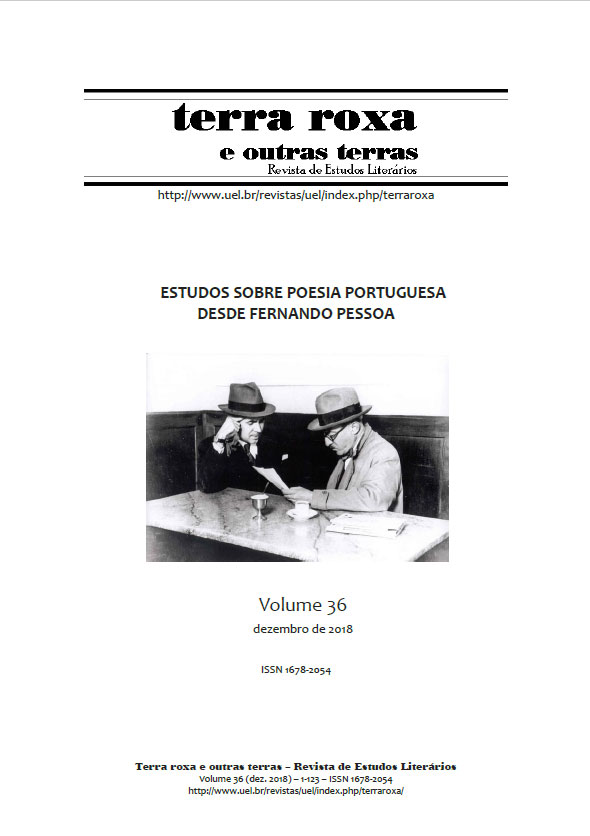"talvez o mundo pare de acabar tão depressa" [Maybe the world will stop ending so fast]: about a poem by Filpa Leal
DOI:
https://doi.org/10.5433/1678-2054.2018v36p54Keywords:
Contemporary poetry, Filipa Leal, Mário de Sá-Carneiro, ExperienceAbstract
The reflection for the writing of this article begins in the manifesto written by the Portuguese poetess Filipa Leal. From the defense of the readers of poetry, the poetess seems, ironically, to challenge the position of the readers of the novels. Nevertheless, we can observe that some critics note the presence of a narrativity in the contemporary poets. This feature seems to confirm that the absence of a more present genre, which is not a novelty of contemporary poetry, is confirmed as a possibility to talk about a time that produces its specificities. An example is present in the poem that gives title to the book, "come on Thursday", which is a reference to a poem by Mário de Sá-Carneiro. In other books by Filipa Leal, we can note the presence of a reflection on the liquidity of contemporaneity, a possible reading key for the confirmation of Benjamin's thesis that narration would be a genuine maintenance of experience. Therefore, there is a principle of narration that seems to be relevant to experience.Downloads
References
BAUMAN, Zygmunt. Confiança e medo na cidade. Rio de Janeiro: Zahar, 2009.
BENJAMIN, Walter. Experiência e pobreza. Obras escolhidas. Vol 1. São Paulo: Brasiliense, 1994, pp. 114-119.
BENJAMIN, Walter. Sobre alguns temas de Baudelaire. A modernidade e os modernos. Rio de Janeiro: Tempo Brasileiro, 2000, pp. 103-149.
HELDER, Herberto. Os passos em volta. Lisboa: Cooperativa Editora e Livreira, 1994.
FERREIRA, Pedro. A poesia que dispensa gravata. Esquerda.net, 2016. Disponível em: http://www.esquerda.net/artigo/poesia-que-dispensa-gravata/43312.
HOBSBAWM, Eric. Tempos Fraturados. São Paulo: Companhia das Letras, 2013.
LEAL, Filipa. Cidade líquida & outras texturas. Porto: Deriva, 2006.
LEAL, Filipa. Pelos leitores de poesia. Lisboa: Abysmo, 2015.
LEAL, Filipa. Vem à quinta-feira. Lisboa: Assírio & Alvim, 2016.
MAFFEI, Luís. Para quem escreve quem hoje escreve? Convergência Lusíada (Lisboa), n. 33, pp. 77-87, jan-jun de 2015. Disponível em http://rgplrc.libware.net/ojs/index.php/rcl/article/view/54/52.
MARTINS, Fernando Cabral. O modernismo em Mário de Sá-Carneiro. Lisboa: Estampa, 1997.
SÁ-CARNEIRO, Mário de. Obra completa. Rio de Janeiro: Nova Aguilar, 1995.
SÁ-CARNEIRO, Mário de. Poemas completos. Fernando Cabral Martins (org.). Lisboa: Assírio & Alvim, 1996.
Downloads
Published
How to Cite
Issue
Section
License
Copyright (c) 2019 Terra Roxa e Outras Terras: Revista de Estudos Literários

This work is licensed under a Creative Commons Attribution 4.0 International License.
Authors who publish in this journal agree to the following terms:
a) The authors retain the copyright and grant the journal the right of first publication, the work being simultaneously licensed under the Creative Commons Attribution-NonCommercial 4.0 International License, allowing the sharing of the work with acknowledgment of the authorship of the work and initial publication in this journal.
b) Authors are authorized to assume additional contracts separately, for non-exclusive distribution of the version of the work published in this journal (eg, publish in an institutional repository or as a book chapter), with acknowledgment of authorship and initial publication in this journal.
c) Authors are allowed and encouraged to publish and distribute their work online (e.g. in institutional repositories or on their personal page) after the editorial process, as this can generate productive changes as well as increase impact and citation of the published work (See The Effect of Open Access).
d) The authors of the approved works authorize the journal to, after publication, transfer their content for reproduction in content indexers, virtual libraries and the like.
e) The authors assume that the texts submitted for publication are of their original creation, taking full responsibility for their content in case of any objection by third parties.



















